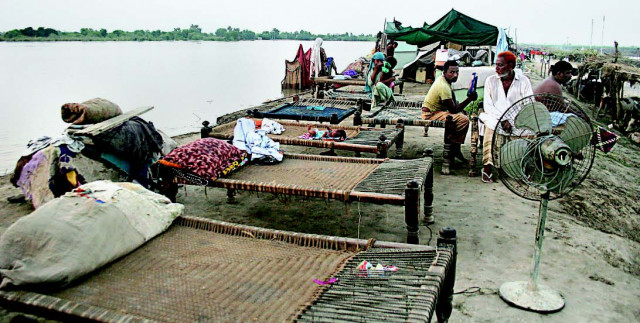‘If they don’t plug cuts in bunds, land will never dry’
The cuts in the protective embankments along the River Indus mean that water will continue flowing through gaps.

The 60-something grower thus anticipates a terrible outbreak of violence in the post-flood scenario. “This water is going to take a long, long time to dry,” he said. “The water will keep flowing through the cuts they made in the bunds unless the government or army close them up.”
The problem here is that dry earth will be needed to close the breaches but everywhere you look, there is water.
Deliberate breaches, for instance, were made in the Beghari Sindh (BS) feeder. But Maher is sceptical the irrigation department will be able to get the job done in time. “If you want to judge their efficiency, take this example. A while ago one of the doors in the canal broke. They came and put in a new one, but that broke too,” he said. The small doors are actually sliding mechanisms at the mouth of an offshoot irrigation canal from the river into the fields. When the metal door is slid down, the water is prevented from entering the channel from the river.
Aside from the breaches, other infrastructure has taken a hit. The Sukkur-Shikarpur road, which was already in bad shape, is now badly damaged, riddled with potholes and strewn with rocks even though the water didn’t make it here.
Maher also predicts a food crisis. “We lost the rice crop in the flooding,” he said. “But we won’t be able to sow wheat in November now because the water will still be there or the land won’t be ready.” As it is looting is rampant. Armed men in boats have been sneaking into abandoned areas, breaking down shops and stores and taking off with supplies. “When a man is hungry and his children are hungry, he’s going to take up his gun,” said Maher. When asked if the police were anywhere to be seen, he said that they won’t be able to control any such situation.
“You know how the Baloch women wear baalis (earrings). Well, they’ve been holding them at gunpoint and robbing them,” he said. “A sardar had to intervene when one man was robbed of 35 cows. These people are down and out and they do this to them.”
People from surrounding villages started arriving in Sukkur about a week ago and a fresh wave of displaced people has started arriving from Jacobabad. “They are going to be stuck here till long after Eid,” Maher predicted, primarily because he feels the waters are going to take a long time to recede.
They have arrived with tractor-trolley combinations piled high with refrigerators, TVs and other household appliances. The people eat and sleep with their livestock tethered near by, so afraid are they of losing what little they managed to save.
Relief work
When Maher’s 23-year-old son Musheer was away from the house the whole day, the elderly lawyer started to get irritated. But then he saw the relief camp Musheer and 12 of his buddies had set up opposite the Hayat CNG he felt an immense sense of pride.
“I met a man on the road who said that they had lost 80 of their cattle that cost Rs100,000 each,” said Musheer. “He asked for my help and said he had some money, if I could just get him some clean drinking water.” Musheer realised that he simply had to do something. So he and 12 friends got together and erected a tent by the side of the road and started getting bottled water, milk packs for the children and cooked food.
“The worst thing is that people are ignoring the kids,” he said. “The adults are taking the milk meant for the kids. They’re crazed with hunger.”
Musheer and his friends got a small Suzuki pick-up to try and distribute food elsewhere and were ambushed by starving people. “They surrounded us and one of my friends was attacked. They ripped his shalwar!”
It has nonetheless been a learning experience for these young men. They have been slowly figuring out better ways to distribute the packets. His father got together with the transporters’ union and these vehicles help with the distribution.
For a few days they had rice cooked but then they realised that people would get tired of it. “We gave the order for lentils and naan, and you should have seen the people when they found out,” said Musheer. “It was madness.”
For now, Musheer said that given their donations they should be able to keep feeding people, but he doesn’t know how long this will continue. “I went to the market to get fruit and everything was Rs100 a kilo,” he said. “I asked the guy what the hell was going on, and he said, ‘You should’ve come yesterday. It was more expensive.’”
Published in The Express Tribune, August 15th, 2010.


















COMMENTS
Comments are moderated and generally will be posted if they are on-topic and not abusive.
For more information, please see our Comments FAQ